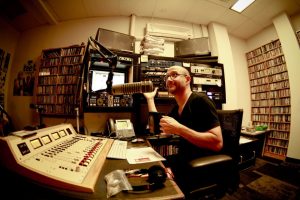 There’s no accounting for why we each repeat the same pointless ritual every day, despite failure after failure. Every day we spin and spin through the radio dial trying to find original and interesting music. Click… heard it, click… boring, click… eh. Different voices, modified lyrics, jazzed up arrangements, but the same old, tired songs.
There’s no accounting for why we each repeat the same pointless ritual every day, despite failure after failure. Every day we spin and spin through the radio dial trying to find original and interesting music. Click… heard it, click… boring, click… eh. Different voices, modified lyrics, jazzed up arrangements, but the same old, tired songs.
I sometimes think I’d rather have hotlead poured into my ears than listen to this stuff. Perhaps all the songs have been written. However, there remain three immense veins of musical gold open to further exploration. Each still holds a mother load.
First, experimentation: Today, anyone can be a musician. The equipment required for high fidelity recording, which would’ve cost $100,000 twenty years ago, can be cobbled together by a teenage music geek in his parent’s basement with a family computer, bootleg software and a microphone. Because of this do-it-yourself era, the experimental spirit thrives. Music software is so advanced that a chimp can push a few buttons, string together some loops, and knock out a tune in 15 minutes. With music so easy to create, the whole world, via the Internet, has access to vast quantities. On one hand, it is wonderful that so many people can now enjoy music creation, instead of just small elite. On the other hand, the river of song flowing down the file-sharing networks is mostly unremarkable. While the enterprising lone artist may find new opportunities, it is tough for any one person to shine above this vast mass.
Next, great music is fertilized by cross-pollination: When African, Native American, French and European sounds mixed with bare cheated women throwing beads on all-night drunken carnivals in a little town called New Orleans, a quirky new form of music was born, called Jazz. When that sound swung the South and swirled amongst João and Astrud Gilberto, Antonio Carlos Jobim and Sergio Mendes, along with Stan Getz, Charlie Byrd, Herbie Mann and Chick Corea, Brazilian Jazz spread internationally. Great movements of Art generally come from “scenes.”
It is no accident that greatness emerged when Bob Dylan, Joni Mitchell, Joan Baez, Crosby, Stills, Nash and Young, James Taylor, Carole King, the Beatles, the Beach boys, The Eagles, etc, inspired each other. A new genre exploded from the resonance of this 60s/70s folk/rock music scene. Pop music loves that mix – and that means there is plenty of money to be made by blending together the sounds of different cultures.
Finally, profound art is found inside: Well, here in LA, where every musician from Seoul to São Paulo comes to get rich and famous, just getting time on stage is difficult. Plentiful, well paying gigs…dream on. On the bright side (bright?), pack a city with desperate musicians and only brilliance will survive. Such desperation and fierce competition for limited resources leads the artist either to simply give up, compromise their work, or to search deep inside self for something extraordinary. Only extraordinary art has the force to ascend to the top of this ocean of talent. The rivalries and collaborations, the pushing and pulling, draws Darwin from Galapagos tide pools to Los Angeles night clubs. I believe the richest region for that search is in our emotions. When did music become so emotionally monotonous? Pop is happy & sexy; Rap is angry & Alternative; Punk, rebellious; Country, sentimental; Gospel, inspirational. Today, each musical genre is limited, by and large, to one emotional note.
Musicians of old saved souls from the unfeeling bog of monotony. Whether in a Hollywood club or concert stadium, only by excavating the deepest emotions can the musician dig out and free those “comfortably numb.” In the artist’s furthest extremities, and darkest core, lie the pathos, passion and fresh information that people hunger to find in the arts. Sophisticated audiences do indeed demand compelling, visionary music. We recognize great music because those who hear it are transfigured. From a wild, uneasy place comes by such extraordinary creation. Through the impossible struggle for both inward revelation and outward success – or merely survival, we must support our musicians, for their acts of creation emulates and honors the work of the Creator.
*Peter Ludwig is a cellist, music and video producer, and author focusing on spirituality through the arts. He hosts the broadcast radio show “In a Dream with Mystic Pete” on KXLU in Los Angeles, every Saturday at 11pm. www.MysticPete.com
